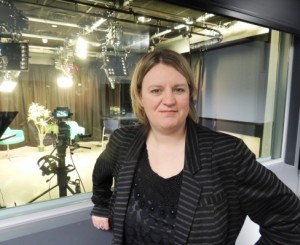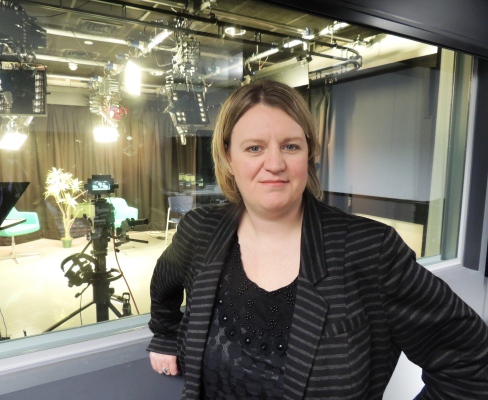
With January work placements fast approaching, JMU Journalism final year students were offered an insight into the demands of regional television reporting, as ITV Granada’s Head of News gave a guest presentation.
Lucy West, who took the top role at Granada in March, pulled no punches in describing exactly what was expected of a journalist working for regional news, having previously headed up the Tyne-Tees region for ITV.
If any further realisation was needed, hearing of the recruitment process being whittled down from 3,000 for just four jobs was a tough reminder of the world third year students will be entering into.
Lucy did explain how courses like the JMU Journalism degree are vital to gain the type of knowledge and experience needed to succeed in the world of news media.
She said: “You’ve got to know the theory. There are parts of journalism that you’ve just got to sit down and learn, like the law and the broadcasting code, but the more realistic it can be and the more it tests your skill working under pressure then that is what equips you for the real world.
“You can pick up skills but you don’t really have that experience until you get tested. If you can go on a course that’s heavily waited to the practical side then that’s a really good thing.”
Lucy was in charge of Tyne-Tees news at the time of the Derrick Bird Cumbria shootings in 2010 and her team was credited heavily for a lot of the work which won ITV a BAFTA for its coverage of the story.
She explained the importance of a good news sense, saying: “Trust your own instinct and don’t ever be swayed by someone else saying it’s not that great a story. If you believe in it and you’ve got the evidence to back it up then stick with it. You’ll kick yourself if you don’t.”
Lucy admitted that there is somewhat of a gulf between training and the real working world, but also that the multimedia education offered by courses like JMU Journalism stands students in good stead: “It’s a big step up. When people come into our newsroom they’re really shocked by how quickly people have to get out and turn a story around. The more that you can experience that world the better it is for you.
“Having multimedia training is really important. A story can break anywhere at any time and you’ve got to be ready for that. If you’re not skilled across every platform and you’re not putting your content on every platform then your story is not being seen by the people who should be seeing it.”
https://www.youtube.com/watch?v=8ZKPYC6z4SU
Lucy explained that persistence is the key when applying for jobs and finished by explaining what would be expected of anyone on work placement at ITV Granada: “We’re looking for ideas. You need to be willing to speak up and make suggestions.
“I need people to act on their own initiative so if they want to sit in the corner and read the newspapers then they’ll be left in the corner reading newspapers. They need to fit amongst the team and be diplomatic. People are busy but they will give you their time.
“If a big story breaks then try to offer your help, even if it’s getting everybody a cup of tea because they’re suddenly flat out.”

